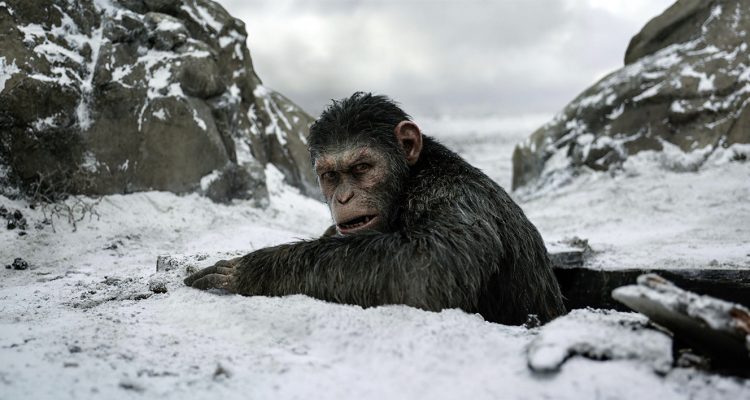“An eye for an eye makes the whole world go blind” may be something of a cliché, but especially in these toxic and vindictive times, its a truism of divided tribalism that is leading civilization to ruin. Intentional commentary on modern culture or not, Matt Reeves, the thoughtful director behind “War For The Planet Of The Apes,” explores the tragic cycles of violence with gripping results. It’s glib to say it, but let’s get it out of the way: audiences eagerly awaiting “The Batman” should feel excited — Reeves is the rare blockbuster filmmaker that can creates epic scale without abandoning the intimacy of characters and relationships. Brimming with emotional intelligence, the human texture Reeves delivers in ‘Apes’ separates his film from the rest of the tentpole pack.
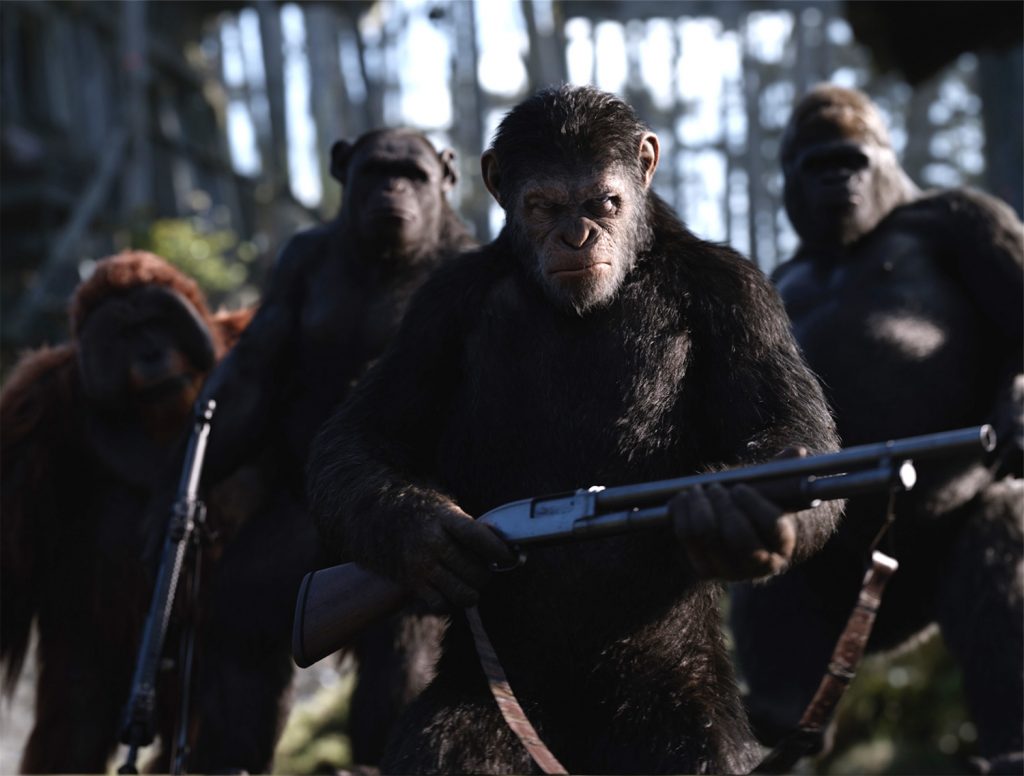 The final film in a trilogy — and acting as a prequel to the original, 1969 version of “The Planet Of The Apes” — Reeves’ concluding chapter goes out on a seriously high note. And not unlike each entry in Christopher Nolan’s “The Dark Knight” series, rather than moving on onto another unrelated adventure, the director examines the consequences from previous films and adroitly brings the entire narrative full circle to the hostile laws of nature, the cruel irony of evolution, and the indictment of mankind that’s fundamental to the ‘Apes’ saga.
The final film in a trilogy — and acting as a prequel to the original, 1969 version of “The Planet Of The Apes” — Reeves’ concluding chapter goes out on a seriously high note. And not unlike each entry in Christopher Nolan’s “The Dark Knight” series, rather than moving on onto another unrelated adventure, the director examines the consequences from previous films and adroitly brings the entire narrative full circle to the hostile laws of nature, the cruel irony of evolution, and the indictment of mankind that’s fundamental to the ‘Apes’ saga.
“War For The Planet Of The Apes” centers on the fight-for-survival relationship between the chief simian Caesar (Andy Serkis) and a remorseless human warlord simply known as The Colonel (Woody Harrelson), who is hell bent on ape genocide. Still dealing with the aftermath of “Dawn Of The Planet Of The Apes” — the morally indefensible ape Koba having started a war despite Caesar’s attempts to broker peace — the primate population is dwindling and the monkeys are trying to hide away deep in the forests. Nonetheless, the pattern of aggression is ceaseless, a critical peace offering is rejected, and one brutal retaliation is so agonizing, it unleashes Caesar’s darkest instincts and sets him off on a violent collision course with the coldblooded Colonel.
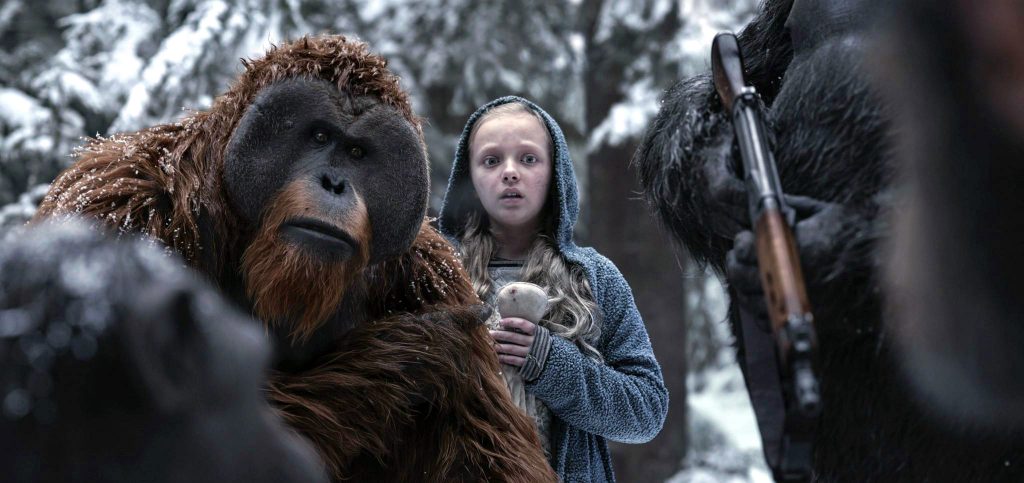 After bloody battle sequences that recall Kubrick’s scenarios of combat, “War Of The Planet Of The Apes” then reveals itself as a heart of darkness odyssey of revenge. However, Caesar’s morality and innate sense of empathy is challenged by a little human girl named Nova (Amiah Miller), who is discovered along the journey.
After bloody battle sequences that recall Kubrick’s scenarios of combat, “War Of The Planet Of The Apes” then reveals itself as a heart of darkness odyssey of revenge. However, Caesar’s morality and innate sense of empathy is challenged by a little human girl named Nova (Amiah Miller), who is discovered along the journey.
Aesthetically, Reeves doesn’t really try and hide his references and influences. Playing with genre, the filmmaker takes his cues from the cold austerity of “Full Metal Jacket,” Clint Eastwood‘s Western tropes, “The Great Silence,” and the same wintery Westerns that informed “The Hateful Eight.” Most obviously, Reeves is nodding his cap to Francis Ford Coppola’s everlastingly influential “Apocalypse Now.” However, even as he crafts a story not unlike Captain Willard on a mission to terminate Colonel Kurtz with extreme prejudice, as much as he tips his cap with cinematic allusions, the keen director never forgets the emotional layers that inform and underline his themes of unity, clemency, retribution, and karmic payback.
‘Apes’ asks that we face our humanity through the eyes of Caesar and the moral challenges he faces. The specter of Koba (Toby Kebell), the pitiless ape and rival killed off in the previous film, haunts Caesar throughout, forcing the ape leader to confront whether his soul has become as blackened as his former ally turned enemy. Caesar’s internal conflict, to seek vengeance or rise above the hatred is the film’s ethical heart, but there are no easy answers to his burning sense of vengeance.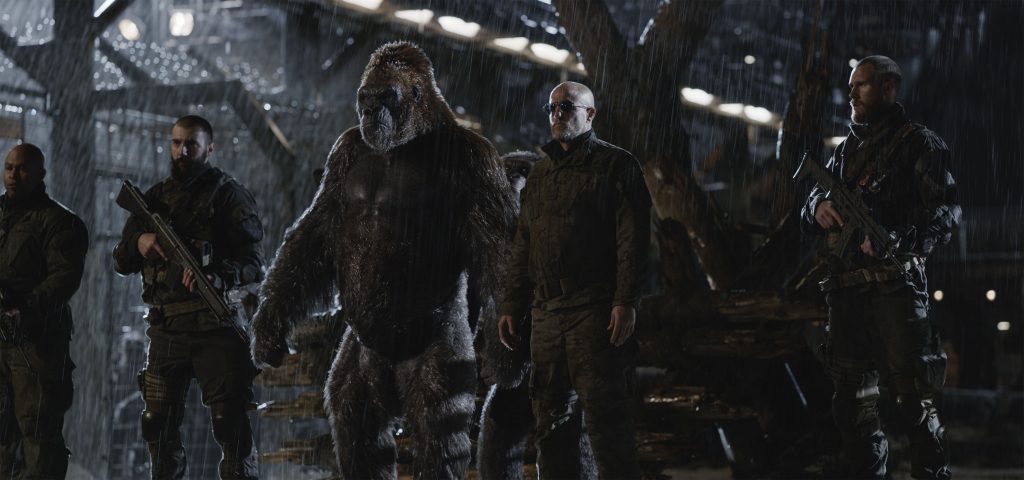
Of course, in the middle of this solemn consideration of compassion and the darkest of primal impulses, lies an intense dramatic thriller ultimately about the heavy cost of retribution and the currency found in mercy. Both entertaining and somber, “War Of The Planet Of The Apes” makes the case for a smart blockbuster that doesn’t have to pander to four quadrant considerations for success.
Technologically, ‘War’ is another triumph. Visually, the photorealism of flesh and hair — traditionally the hardest VFX to pull off — is masterful, no one pushes motion capture the way WETA does, and superb performances elevate already beautifully generated images. Don’t be surprised when some start beating the drum for some kind of motion capture performance award for Andy Serkis who has become the maestro of this technique. And I’d be remiss if I didn’t mention Michael Giacchino’s tremendously suspenseful score.
As engrossing as it can be, ‘War’ isn’t totally beyond reproach. The tension-breaking valve of comedic relief in the character “Bad Ape” (Steve Zahn) is over-ventilated and an expository dialogue dump from Harrelson’s sociopath character undercuts the painful story behind his unhinged motivations. This unfortunate scene kills the momentum of the movie too. But none of these foibles can destroy the durable picture. If there’s a knock to be made on this absorbing action drama is that it’s not quite as peerless as its predecessor, ‘Dawn Of The Apes’ — a movie you cannot help compare it to given that it examines many of the same patterns of malice, broken treaties and perpetual reckoning.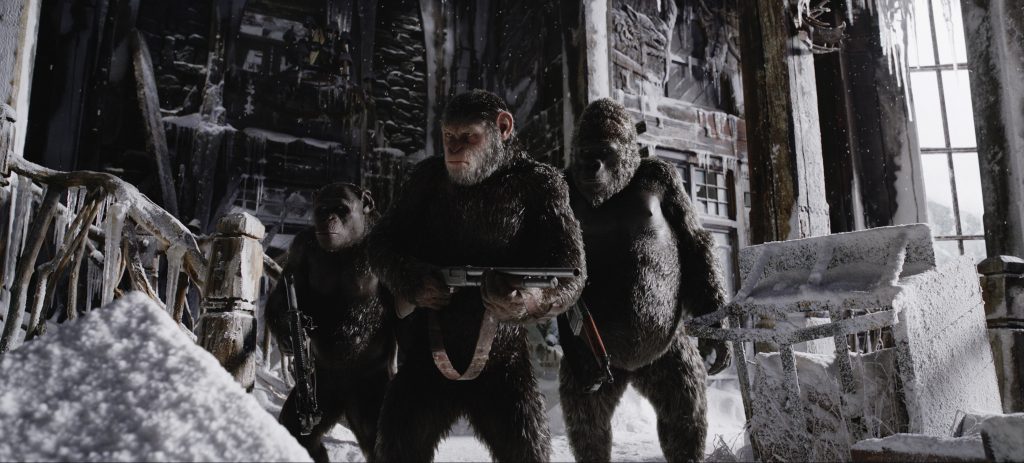
Still, in a sea of often simple tentpole films, “War Of The Planet Of The Apes” is exceptional. Ultimately, for all the combat, the film is really about the battle for Caesar’s soul and whether he’ll be blinded by bloodlust or find his humanity. This conflict within is the true stakes of the film, and a window into a very human heart beating inside a battered exterior. [B+]

